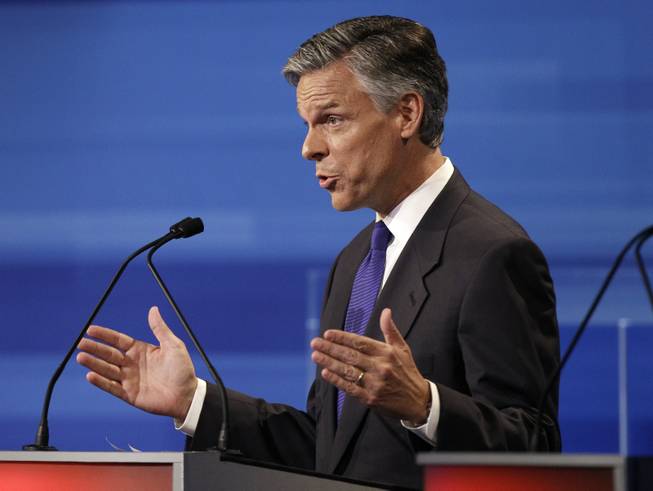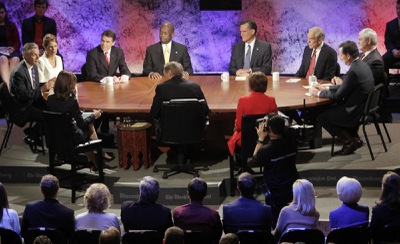
Charlie Neibergall / AP
Republican presidential candidate and former Utah Gov. Jon Huntsman speaks during the Iowa GOP/Fox News Debate at Cy Stephens Auditorium in Ames, Iowa, on Thursday, Aug. 11, 2011.
Thursday, Oct. 13, 2011 | 9:02 a.m.

Republican presidential candidates, from left, former Utah Gov. Jon Huntsman, Rep. Michele Bachmann, R-Minn., Texas Gov. Rick Perry, businessman Herman Cain, former Massachusetts Gov. Mitt Romney, Rep. Ron Paul, R-Texas, former House Speaker Newt Gingrich and former Pennsylvania Sen. Rick Santorum are seen at the debate at Dartmouth College on Tuesday, Oct. 11, 2011, in Hanover, N.H.
Sun Coverage
WASHINGTON - As Nevada and New Hampshire bear down in a political arm-wrestling contest over primary and caucus dates, presidential candidate Jon Huntsman is weighing in: He pledged to boycott Nevada’s caucuses if the state doesn’t budge, and is calling on the other candidates -- especially front-runner Mitt Romney -- to do the same.
"In an effort to preserve New Hampshire's historic first-in-the-nation primary status, the Huntsman campaign will boycott the Nevada caucus as long as the state continues to jeopardize New Hampshire's primary date,” Huntsman campaign manager Matt David said in a statement released Thursday morning. “We call on the other campaigns to join us, especially Governor Romney's campaign given their involvement in moving Nevada's date forward."
It’s an apparent bid to curry favor with New Hampshire voters, but one that doesn’t seem to require too much sacrifice on Huntsman’s part, as he doesn’t have a ground operation in Nevada.
But Romney, who won the 2008 Republican caucuses in Nevada, does -- and he’s come under some fire in the last week for reports that he used his on-the-ground influence to get the state GOP to move up Nevada’s caucus date to Jan. 14.
Romney’s campaign has vehemently denied the allegations, and pledged that Romney will continue to campaign and appear in the Silver State.
“Governor Romney is competing in every other nominating contest across the country -- whenever they are scheduled,” Romney spokesman Ryan Williams said in a statement that also stressed Romney “is firmly committed to preserving New Hampshire’s first-in-the-nation primary.”
“It is up to each state to determine the date of their primary or caucus, and Gov. Romney has consistently supported Nevada’s status as an early nominating contest that follows New Hampshire,” Williams continued.
All four early states -- South Carolina, Nevada, New Hampshire and Iowa -- scrambled in the wake of Florida’s decision last month to move its primary to Jan. 31, to claim dates in advance of Florida, even though that put every one of those states in violation of Republican National Committee rules. Under those rules, states that hold their election contests before Feb. 1 lose half of their delegates to the national convention.
Nevada was expected to have about 28 delegates; if it sticks to Jan. 14, it will have about 14 divided among the candidates based on their showing (Nevada’s caucuses are not winner-take-all).
While Huntsman does have the benefit from being from a Western state -- he was governor of our neighbor to the east, Utah -- and might grab support from Nevada's Mormon community, he’s trailing far behind the former Massachusetts governor in local polls. Nationally, he’s been teetering on the edge of obscurity: a candidate has to maintain about 1 to 2 percent of the electorate in mainstream polls to be included in nationally televised debates, and Huntsman has come to the brink of being excluded twice.
A regular roster of eight candidates have appeared in most of the GOP debates held thus far (the ninth, Gary Johnson, former governor of New Mexico, has appeared in one).

Join the Discussion:
Check this out for a full explanation of our conversion to the LiveFyre commenting system and instructions on how to sign up for an account.
Full comments policy